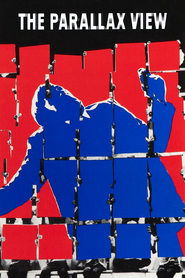Although it predates much of what was to come, at the end of the day it's hard to love a film that indulges the viewer in so much in the conspiratorial instincts that are now inextricably linked to 9/11, vaccines, etc. It's no longer shocking that corporations and politicians might be violently malevolent. What's really shocking is that our protagonist can board a plane with neither ticket nor ID and is able to pay his fare—in cash!—to the stewardess after take-off. More seriously, though, The Parallax View film strikes me as 'experimental' in two ways. First, the extended sequence of static images in the Parallax Corporation's test is essentially an experimental film within a film, albeit something that a student filmmaker might produce, specifically one who believes that they alone can know the truth about 'American fascism'. Secondly, the juxtaposition of genres feels like a (mostly) controlled experiment as well: Of course, the backbone of the movie is that of a government and corporate conspiracy thriller but is heavily seasoned by many light comic moments, such as the bar fight, police car chase and the assassinated politician driving his golf cart into the gala seating. That being said, the parallels (sorry…) to The Manchurian Candidate (1962) are a little too conspicuous at times, especially as both films have as their climax a political rally in the large hall accompanied by all the usual US pageantry and the bad guys lurking amidst the lighting gantries. There is also some resemblance to Playtime (1967) in some of the office sequences, too.
Still, after Francis Ford Coppola's The Conversation, the The Parallax View didn't quite land with me, yet it does have a nice little touch in the final scene of the judges that suggests that the 'conspiracy peddlers' watching this very film might be next. Love the opening visual touch at the beginning that reminds us that even the Pacific Northwest (with its relatively squeaky-clean reputation) is, like the rest of the United States, based on appropriating the lands and culture of indigenous people. Indeed, Chuck Bowen wrote in his review for Slant that "the opening image—of a totem pole that obscures the Space Needle from a certain point view—initially seems like a joke but signifies the film’s ongoing obsessions with erasure and co-option."
In his essay for Criterion, Nathan Heller writes that:
Catwalks, Space Needles, escalators, convention centers: Pakula’s fixation on the structures of corporate-era modernity gives his images their visual flavor, but it also reflects a conceptual focus in his work during this time.
… and I can see the continued influence for the use of 'bureaucratically scary' modern architecture in all manner of modern films and TV, even down to the antiseptic sets of Stargate SG-1. Nathan goes on to muse about the genre of The Parallax View:
Unlike full-on neonoir projects like The Long Goodbye or Body Heat or Chinatown […], Pakula’s movies don’t take much from the classics in the way of character or story structure (no femmes fatales or midnight car rides here). What he created instead was a noir of urban modernity—“a darkness shining in brightness,” to quote Ulysses […]—that was specially suited to an aborning corporate age. Today, that looks like prescience. At the time, it was a dizzy vantage. Paranoia is a slightly misleading term to apply to Pakula’s films of this period, because paranoia is a victim state that overshadows normal life (a mood that we associate with those earlier, Hitchcockian conspiracy films, in which someone is plucked from daily experience and thrown into the middle of a scheme). In Pakula’s films, people seek out conspiracy; like Frady, a reporter prowling for a scoop, they’re always looking for the darkness in the bright.
He then attempts to set it apart from other conspiracy thrillers:
This is a movie much more interesting than the individual-against-the-system thriller it appears to be. It offers a critique of that heroic certainty. It suggests that the system is a menace, yes—but also that there’s something futilely out of control, something entropic, in people who feel driven to take solutions into their own hands. Are they our saviors? Can we rely on them in the end?
The Parallax View is especially disturbing and relevant in our age of weaponized conspiracy theories. Like a paranoiac’s dream, the film feels as if it’s making itself up as it goes along, as it reportedly was.
— Chuck Bowen (Slant)

